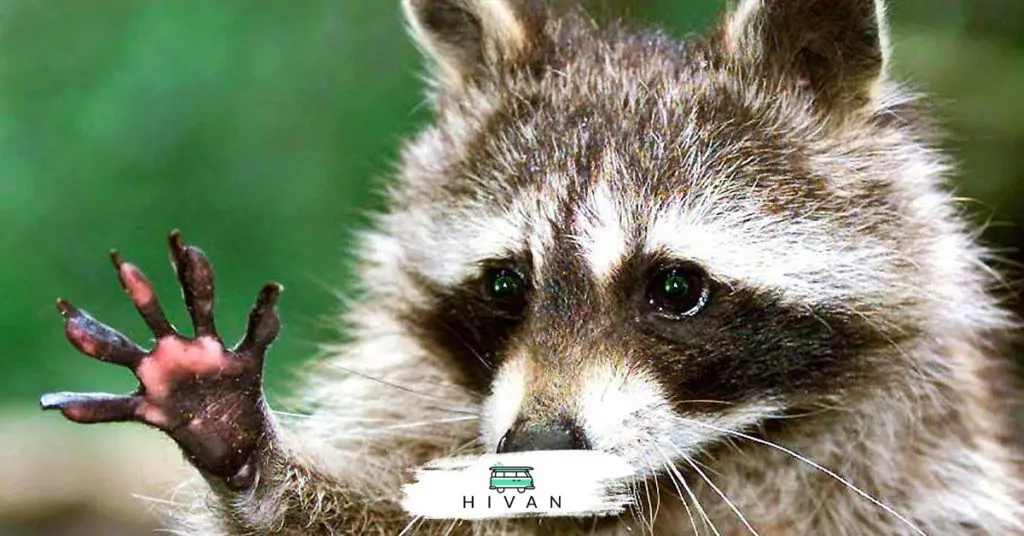Hi-van is supported by its audience. When you purchase using our links, we may earn an affiliate commission (no added cost to you). Learn more
Raccoons are probably the last species you’d be afraid of when you’re camping in the woods. As a camper, you’re probably bear aware, but many other forms of wildlife can also mess with your stuff when you pitch your tent in their natural habitat, like raccoons, for instance. Can they open zippers and get into your tent?

Raccoons are incredibly clever and dexterous animals with paws that function almost like human hands.
They are known to be able to open jars, doors, and yes, even zippers.Raccoons are curious creatures and excellent problem-solvers, making them capable of opening tents or other items that are secured with zippers.
If camping in an area inhabited by raccoons, it’s advisable to secure food and belongings in a tough, locked container to prevent them from accessing your stuff.
If a raccoon sneaks into your tent, then having your food stolen is the last of your worries. A raccoon bite can potentially lead to rabies and some other dangerous diseases. Keep reading this article to learn how to keep these animals away from your tent and campsite.
How To Keep Raccoons Outside Your Tent

Keeping raccoons away from your campsite can be crucial for a peaceful camping experience. Follow these tips if you don’t want to see them anywhere near your camping spot, let alone inside your tent.
When it comes to avoiding raccoon encounters on your campsite, everything has to do with food. How you store, eat and throw away food makes all the difference in how attractive your camp is to raccoons.
Secure Your Food
Securing your food is crucial when camping to avoid attracting wildlife such as raccoons. Here are some tips specifically about securing your food:
- Bear-Resistant Containers: Invest in containers specifically designed to be resistant to wildlife.
- Coolers: Use secure, high-quality coolers, and consider using locking straps.
- Hanging Food: Hang food in bags from a tree, away from the trunk and off the ground.
- Odor-Proof Bags: Store items in bags designed to minimize food odors.
- Avoid Leaving Food in the Car: Keep food out of sight and car windows closed.
- Cook Away from Sleeping Area: Maintain distance between cooking and sleeping areas.
- Clean Cooking Utensils and Dishes Immediately: Reduce lingering food odors at the campsite.
- Avoid Keeping Food in the Tent: Prevent attracting wildlife to your sleeping area.
- Using Campsite Food Lockers: Utilize available secure storage options at campsites.
Implementing these strategies will help in keeping your food secure from raccoons and other wildlife, ensuring a safer and more enjoyable camping experience.
Manage Your Trash

You might think throwing a banana peel somewhere around the campsite isn’t a big deal, but its scent could be enough to attract a raccoon. Make sure you make no compromises on cleanliness during camping if you don’t want to see raccoons anywhere near the campground, especially when it comes to spills or food scraps.
Sweep the inside of your tent regularly and scan the campsite every now and then for any remains or empty food containers thrown around the area. Don’t leave dirty dishes lying around when you go to bed, as they can also attract these unwelcome customers at night.
![]() Always keep trash in a sealed container.
Always keep trash in a sealed container.![]() Dispose of trash regularly and avoid leaving it out overnight.
Dispose of trash regularly and avoid leaving it out overnight.
Bring Your Dog

I saved the best for last — dogs! Raccoons aren’t fans of loud barking noises as it signals predator danger. Having your dog accompany you on your camping adventures can significantly reduce your chances of dealing with a raccoon problem on campgrounds.
Besides barking, raccoons are also scared of loud noises in general. If one manages to sneak into your tent, dropping something heavy on the floor should be enough to scare it away.
Beware of Other Wildlife
Raccoons are annoying, but they’re not the only species you should be careful of while camping. The biggest threat is bear encounters, so make sure you’re well-read on being bear aware before you set out.
The tips I’ve shared above won’t just keep you safe from raccoons but also animals like coyotes, boars, bears, rats, and more. That’s because your food is what attracts them all. You’re less likely to attract any of them if you’re careful about how you eat, store, and dispose of your food.
More info: related article about wildlife: Does Bear Spray Work on Coyotes?
Conclusion
If you’ve learned one thing from this article, it’s that cleanliness is key to avoiding attracting any unwanted animals lingering around your campgrounds.
No matter how well-prepared you are for raccoons, prevention is always better than cure. Make sure you research your campsite well before pitching a tent. Some patches on forest grounds are known for housing raccoon habitats, so ask the authorities and steer clear of any such locations.
Have fun!
Find this content useful 🙂 ?
Subscribe to our Newsletter and get a free Solar Electric Diagram + shopping list.

